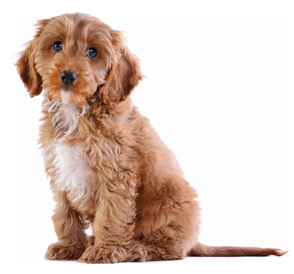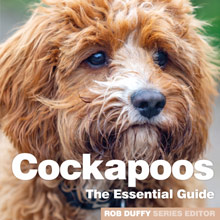Owning & Caring for a Cockapoo
Caring for Your New Cockapoo by Perfect-Pets Books
The adorable Cockapoo is a popular breed for many different types of dog owner, and their sweet faces and personalities mean there is no mystery as to why. With rates of purchase and adoption booming over lockdown, it is time to give a crash course in Cockapoo care for all the new puppy parents out there.

Cockapoos are a combination of two full breeds – Poodle and Cocker Spaniel – and are not yet recognised by any purebred associations despite having been around since the 1950s. Like any breed, it is important that you do your research before taking home a Cockapoo to make sure that the dog is right for you. This article will go over some of the key points you will need, but we recommend you do further research if you are seriously considering a Cockapoo as your first dog.
Cockapoos are generally regarded as small – medium dogs, with the average pooch measuring between 10 and 15 inches high. Most will weigh somewhere between five and ten kilograms. There can be a great deal of variation between individual Cockapoos in terms of character traits, appearance and size, as the cross can be bred from a wide variety of parents. Estimating what size a Cockapoo will grow to can be particularly tricky. Much of your dog's size will depend on whether their poodle parent is a toy, miniature or standard breed, and on the individual dog.
If you want a dog you can leave to their own devices while you are at work or away from home, a Cockapoo may not be the best choice for you. Cockapoos are happiest in households where at least one person is at home at all times, as they really thrive on human company. The perfect family pet, Cockapoos are generally very friendly and regarded as being good with children.
Appropriate care should be taken if you have young children, though, as young kids should always be supervised around any breed of dog.
They love to be trained, and are known to thrive in a family home environment with plenty of attention and socialisation. Their coats are reputed to be good for allergy sufferers, and they are generally intelligent, personable, easy-to-train and energetic dogs. We'd expect nothing less from one of the oldest 'hybrid' dog breeds around.
Feeding Your Cockapoo
You'll want to make sure your Cockapoo is set up with a healthy diet from the day you bring them home. This is particularly important if you adopt your dog as a puppy, as the key to a long, happy, healthy life is to start them on the right path from a young age.
A spoonful of high-quality canned food added to moistened high-nutrition puppy food is the ideal combination for very young puppies. To prevent stomach and digestive problems, it is best to find out what food their previous carers had been giving them and continue giving them that while slowly transitioning to the food you will be giving them.
Cockapoos and Crating
It is a good idea to get your Cockapoo used to crating while they are still young. Wire cages can result in injuries if your pup gets their paw, tail or other body parts stuck, so a plastic crate is generally recommended here. For your dog, the crate should feel like a den. Dens are the best place for a dog to rest comfortably and at ease, as this is the environment where they’ll feel most safe and secure.
Getting your puppy used to bathroom breaks is also much easier with a crate as a training tool. What's more, a puppy will happily chew on whatever they can get their mouth around, so a good crate is a great way to keep them out of mischief when you can’t supervise them fully.
Exercising a Cockapoo
If you want to keep them happy and healthy, your Cockapoo will need plenty of exercise. If you have a garden or outdoor space for your pup to roam in safely, it is best to give them at least 2 hours of outside time every day. Failing this, you will need to take them for a thirty-minute walk at least twice a day. Your puppy's mental and physical health really relies on this exercise, and it will also keep your personal belongings safe as pups are more likely to become destructive or naughty if they are bored or depressed from lack of mental and physical stimulation.
Adult Cockapoos require lots of exercise and mental stimulation, as they are intelligent and highly driven dogs.
Cockapoos and Leashes
The best way to ensure your Cockapoo will be well behaved on a leash as an adult is to get them accustomed to walking on a leash as a young puppy. Of course, while training can be effective at any age, starting out on the right foot by training your dog as a puppy is ideal. Maintaining control is also much easier if you avoid using a leash that is too long. Cockapoo collars should be made of flat fabric with about two inches between the neck and the material, and the best length of lead is about 6 feet long.
Treating Your Cockapoo

Dog owners just love to spoil their pups with treats. It can be risky for their health, however, if you give your Cockapoo treats too often (or the wrong treats), so they are best saved for training purposes and the occasional treat. If you really want to treat your pup, try giving them a small piece of fresh cooked chicken or a piece of their dry food. Milkbones and certain other dog treats, as well as people food, are not healthy for Cockapoo pups and are known to cause digestive issues and loose stools.
More info
We hope you've found this article interesting and informative. If you or someone you know have adopted a Cockapoo recently, we recommend continuing your research to ensure you provide your new pup with the best level of care possible. A healthy, happy pup is worth the effort.
For further information on Essential Guides for pet care visit https://perfect-pets.org/

Thank you for the good information I enjoy it.